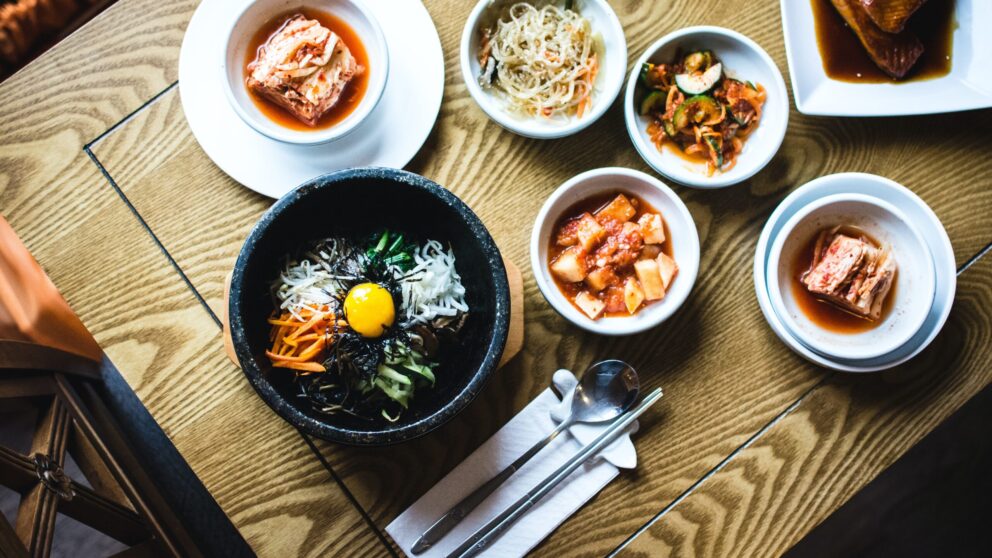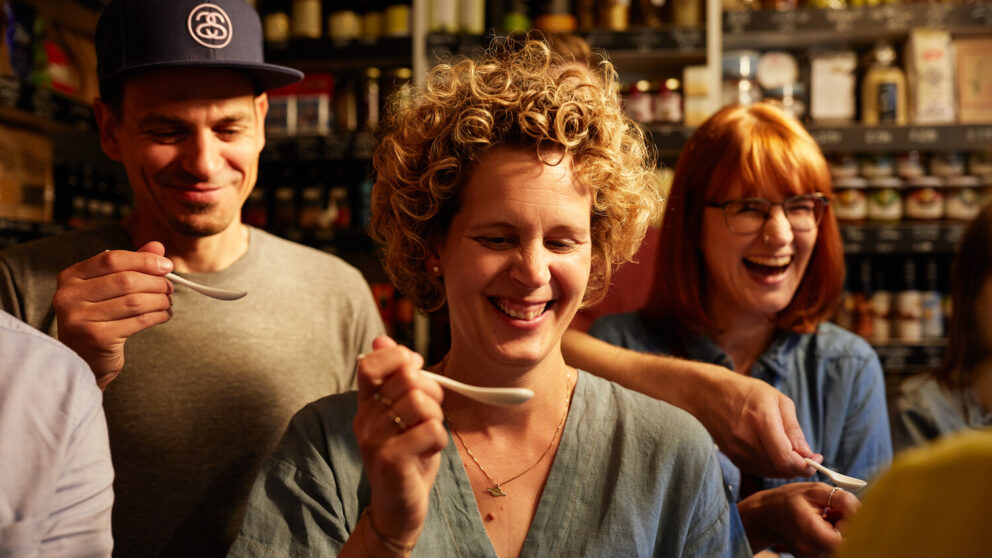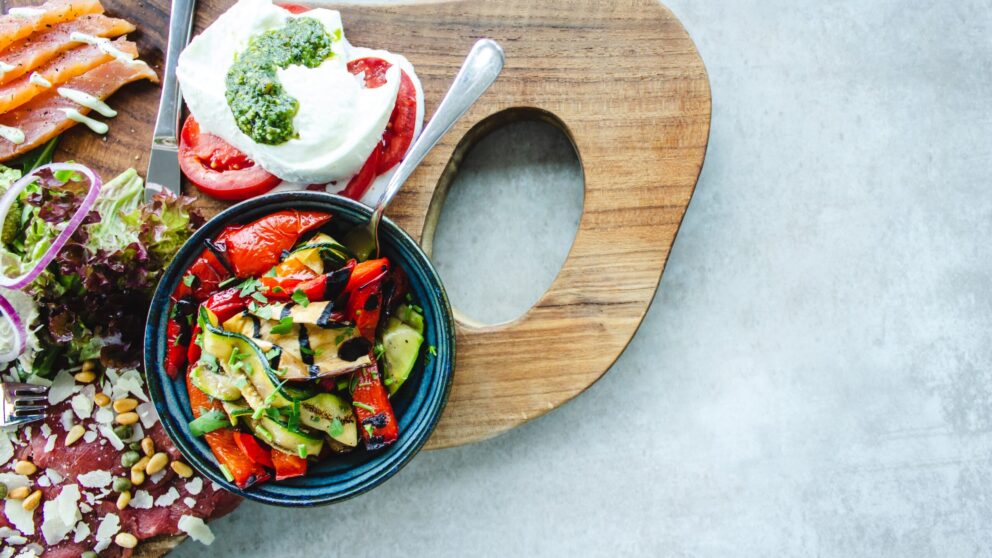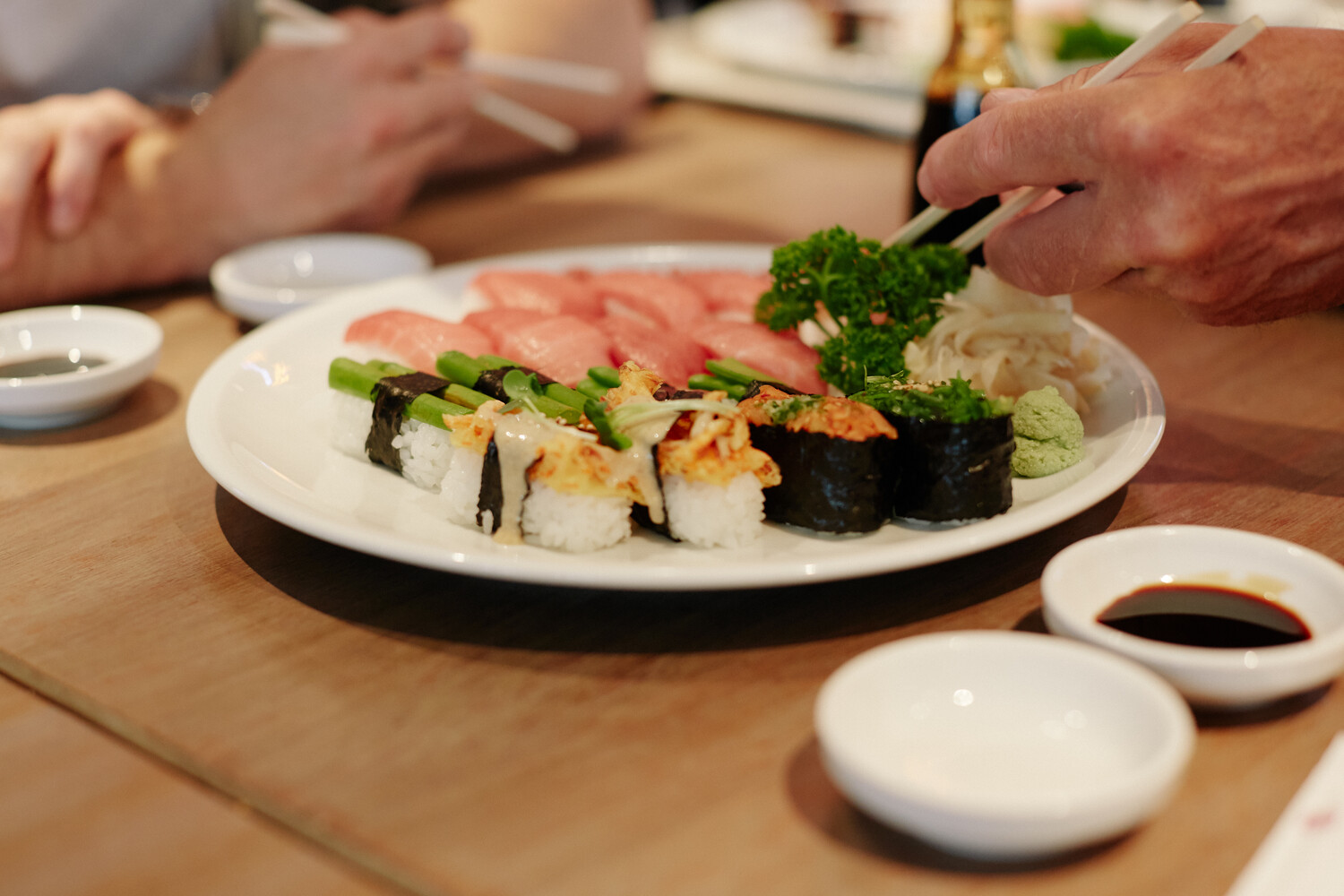
The taste of faraway lands
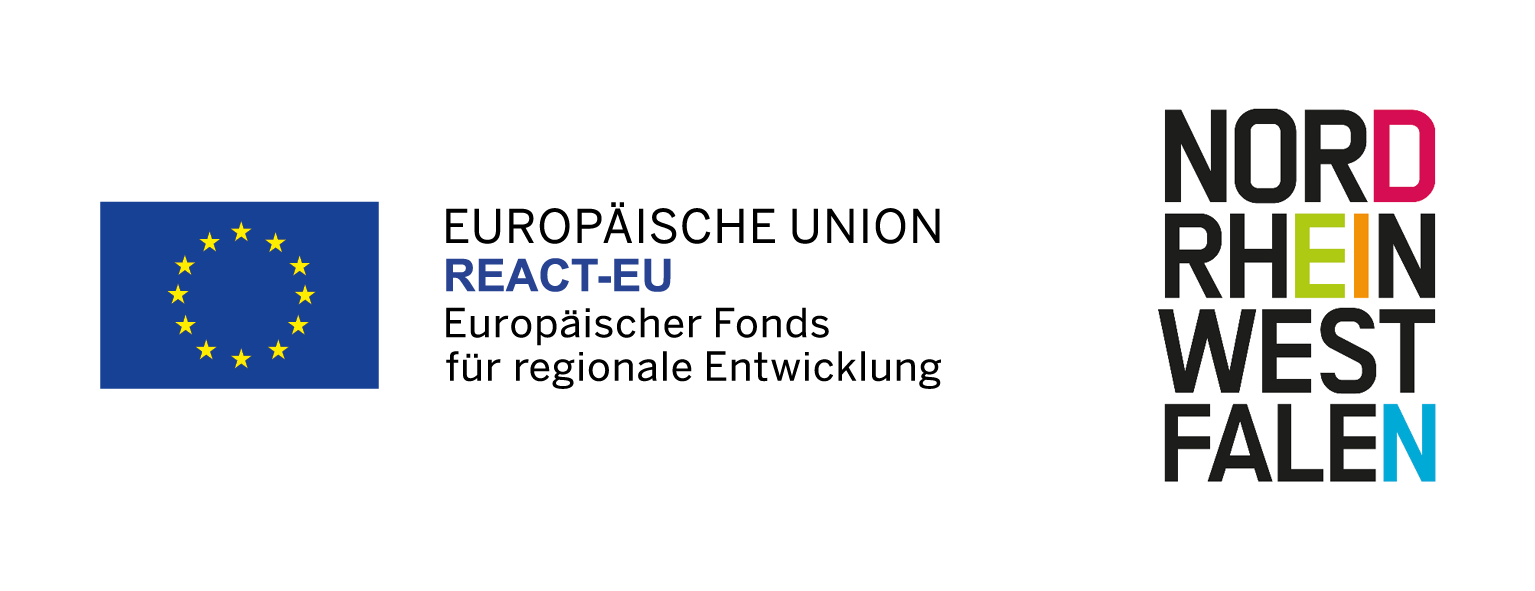
The taste of faraway lands
Dishes from six countries to broaden your culinary horizons
Enjoy the subtle flavours of a meticulously composed sushi variation in the authentic surroundings of Little Tokyo. An expertly prepared meal of French mussels or a Spanish fish dish are pure pleasure on a plate. And the first time you taste tangy-sweet Thai basil is a culinary epiphany you’re sure to remember. Not to mention the lasting impression made by a truly spicy papaya salad. There are so many reasons to keep on exploring the different cuisines of the world. After all, what could be more exciting and satisfying than getting to know a country’s cultural diversity through its culinary specialities? Having activated all of our senses, we considered which countries’ cuisines would be easiest to explore in Düsseldorf. This is the itinerary of our journey through the city’s restaurant scene, complete with a selection of some typical delicacies on offer from each country.
Japan - sushi, ramen & wagyu
Food is culture – nowhere in the city is this simple proposition exemplified in such a creative, down-to-earth and wholehearted way as in Little Tokyo, i.e. the area around Immermannstrasse. From the sushi bars and ramen shops that you’ll find on every corner to izakayas – a type of bar that is very popular in Japan – with charcoal grills, as well as to cafés and patisseries, you won’t find a greater range of authentic Japanese cuisine anywhere in Europe. And the fact that Düsseldorf can lay claim to two out of a total of five Michelin-starred Japanese restaurants in Germany, namely Nagaya and Yoshi by Nagaya, simply adds to the attraction. But specialities such as Wagyu beef are also available at very reasonable prices in the Japanese quarter, for example in the form of grilled skewers, as served by the Kushitei of Tokyo izakaya. If you’d rather cook your own Wagyu on a table grill, try the Ah-Un in Lörick. The Hokkaido Kitchen Zero Banchi is a recently opened subsidiary of the Kushitei, specialising in dishes from Hokkaido, the large island in the north of Japan. You won’t be surprised to hear that Little Tokyo offers excellent quality sushi and sashimi, for example at the long-established Yabase restaurant, at the Nagomi or at the King Fusion, but it is not the only neighbourhood that does. There are also Pempelfort (at the Sumi or the Roku, the third restaurant of Michelin-starred chef Yoshizumi Nagaya, which also serves excellent wines), Unterbilk (at the Kyodaina Poke & Sushi) and Kaiserswerth (at the 4 Seasons). It’s always worth joining the queue at the Naniwa, established in 1986, for hot noodle soup with an extra helping of umami. The Takeichi ramen shop is also very popular, and the Soba-An serves tasty handmade buckwheat flour noodles. For the full authentic Japanese lifestyle effect you’ll also need a touch of pop culture, so treat yourself to dessert in the form of a small, brightly coloured matcha mousse cake at Café Number 18 or head to Bing Go for some fresh taiyaki. Every child in Japan knows these fish-shaped waffles filled with bean paste.
Korea – bulgogi, bibimbab and bingsu
Did you know that Korean cuisine has around 200 different types of kimchi? However, this fermented cabbage, which spices up many a Korean dish while also being good for your health, is by no means the only Korean foodstuff that is prepared in sheer endless varieties. In Düsseldorf, this creativity is reflected most vividly in Little Seoul, the area around Oststrasse, only a stone’s throw from Little Tokyo. In culinary terms, there are also certain parallels between Korean and Japanese cuisine, at least to western palates. But it’s well worth trying to taste the difference. You could start at the Seoul on Klosterstrasse. This family-run business, which makes its own kimchi, has combined the culinary traditions of western and eastern Korea and offers a wide selection of banchan, small side dishes meant for sharing. After all, in Korea, the concept of sharing is key to socialising, which also is at the heart of a Korean BBQ. The Gogimatcha and the Korea Haus/Han Kook Kwan are the go-to places for this congenial style of eating, where you cook your own meat on grills that are built into the table. However, at the Pozangmatcha/Finanzämtche, in the rather incongruous surroundings of what used to be a traditional German pub, the Korean chicken wings are already crispy when they reach your table. For anyone who loves bibimbab, the tasty rice dish with lots of fresh vegetables, served in a hot stone pot, the Gusan on Stresemannstrasse is just the thing. The young multinational crowd at YoGi are very keen on bulgogi (grilled beef or pork). At the Seoul Deli, which is located on Gerresheimer Strasse, slightly off the beaten track, Dodo and Jojo serve up authentic street food, including Korean corn dogs (hot dogs on a stick with a variety of toppings). But what about dessert? You can get that from the Soboro bakery. Or you could head to the Namu café and order bingsu, Korean shaved ice with sweet toppings, also available with soy, oat or coconut milk.
China – dim sum, hot pot and Chinese foie gras
When it comes to Chinese cuisine, the best advice is to just get stuck in! Ms Chen and Mr Dorsch, the brains behind the Green Light District restaurant which opened on Klosterstrasse in 2021, encourage their customers to ‘be curious’. The pair pay close attention to detail as they strive to live up to their motto with their own take on ‘innovative Chinese cuisine’. Where else would you find a menu that looks like a newspaper and features a dish entitled “Tofu cream causes revival of French revolution”, consisting of Chinese ‘foie gras’ made from duck’s liver and fermented red tofu cream with beetroot juice and sesame oil? The Hashi on Ackerstrasse, which describes itself as a ‘petit chinoiserie’, also attempts to bridge the gap between East and West, with creations such as steamed oysters with Shanghai potato salad or venison wontons, as do the two branches of the Böse Chinese. The reputation of the Cooking Dad, a family business on Birkenstrasse, is based on well-known Chinese classics, above all their Peking duck. Although they may follow tradition in the kitchen, the ambience at Cooking Dad is more typical of Flingern than Beijing. The small, informal Fu by Meister Wang on Pionierstrasse similarly undermines the preconception that good Chinese cuisine is normally served in rather sparsely furnished rooms, while also tempting diners with excellent freshly prepared noodles, as does the Gingerboy. The Dim Sum Gourmet on Brunnenstrasse may seem rather plain and unassuming, but not when it comes to the food on offer. The restaurant’s name provides a clue to its speciality, dim sum – small, steamed or deep-fried Cantonese delicacies – much like the Tao China Bistro Dim Sum in Pempelfort. Other authentic restaurants that offer a wide choice of dishes include the Tsun-Gai (everything from steamed squid to yeast dumplings with a sweet lotus seed filling), the Three Kingdoms (whole grilled fish, for example in a spicy Szechuan sauce) and the Dschunke (jellyfish salad with a 1,000 year old egg), all of which are located in the vicinity of Bahnhofsstrasse and Oststrasse. In the same neighbourhood you can also find hot pot, the Chinese version of fondue, at the XiaoLongKan.
France – scallops, steak frites and French gin
We briefly interrupt our journey through the different countries’ cuisines to take stock. We’ve been surprised to see that even Chinese restaurants with their respect for tradition are not averse to crossovers. Some Düsseldorf establishments seem to favour references to the much-lauded culinary accomplishments of Germany’s neighbour, France. Which is understandable, after all, the word ‘gourmet’ itself is French. What’s even better, you don’t have to visit a Michelin-starred restaurant to discover the wonders of French cuisine. Although, having said that, dining at Im Schiffchen or Le Flair, both of which have been awarded one of the coveted stars, is certainly an experience. There’s a good reason why everyone in Düsseldorf has heard of Jean-Claude Bourgueil, the owner of Im Schiffchen. Dany Cerf, who heads Le Flair, learned his trade from Bourgueil. But Düsseldorf also has a whole host of bistros and brasseries where you can enjoy excellent food prepared by highly skilled chefs, among them Bistro Fatal in the district of Flingern. And who should we find in the kitchen, busy creating new takes on old favourites, such as scallops or croque au vin (sic!), using regional, and frequently vegetarian, ingredients? None other than Alexandre Bourgueil, son of Jean-Claude. At Brasserie Stadthaus on Mühlenstrasse you can enjoy classic French dishes sitting below what the restaurant describes as Düsseldorf’s most beautiful coffered ceiling. Also located in the Altstadt (Old Town) is the Parlin – a fusion of Paris and Berlin – the name hinting at the underlying concept. Much the same could be said of La Bouillabaisse, and there is also The Paris Club at the 25hours Hotel. The Rocaille in Derendorf offers a winning combination of freshly prepared patisserie and bistro cuisine, complete with delicious wines. Meanwhile, two new destinations for everything involving the art of savoir vivre have recently opened on the western bank of the Rhine. One is the Anouki on Hansaallee, which offers classic dishes such as moules marinières and steak frites. The other is the Breton bistro Chez Lio on Barbarossaplatz, run by Jennifer and Doris Hülsmann, who are also in charge of the nearby Brasserie Hülsmann. Another newcomer, this time on the eastern banks of the Rhine, is the Francophile Lupin Gin Bar on Ackerstrasse. For the morning after, we recommend a croque monsieur from Les Halles St. Honoré or the Café de France!
Spain/Portugal – tapas, petiscos and pescado a la plancha
We can’t decide who serves the most delicious fish. Nor whose tapas – or petiscos, as the Portuguese equivalent is called – are more likely to make you reminisce about bar hopping in the bustling excitement of a southern European city. It’s a tough call to make, because both Spanish and Portuguese cuisine are deliciously fresh and often have quite a fiery kick to them. Take the Clube Português, for example. This restaurant on Erkrather Strasse, near the alternative scene on Kiefernstrasse, has been the last word when it comes to garlic prawns, gilt-head bream in a salt crust or pastel de nata for much of the past two decades. You don’t have to have been to Lisbon to appreciate ginjinha, a Portuguese sour cherry liqueur that is the perfect way to finish off your meal at the restaurant with its colourfully tiled bar. The hosts, Armando Cortes, Filipe Castelo and Jose Esteves, seem to be driven by some sort of missionary zeal, as the trio also runs two other Portuguese restaurants on Erkrather Strasse, the Cave Tapas and the Frango Português. The small Barril Fado & Tango on Friedenstrasse offers Portuguese cuisine with an Argentinian touch. By contrast, Spanish cuisine rules supreme on Schneider Wibbel Gasse in the Old Town – known colloquially as ‘spanische Gasse’ (Spanish alley). The El Amigo is one of the long-established restaurants there. Another Old Town favourite since 1975 (!) is the El Lazo on Bolkerstrasse, famous for its Spanish specialities as well as Argentinian steak from the charcoal grill. Nearby on Berger Strasse, the La Copa taparia serves small delicacies like pimientos de Padrón, grilled baby calamari and chicken liver in white wine sauce. At the stylish 20° Restobar in the Andreas quarter, down-to-earth Spain meets the slightly more refined Düsseldorf. Especially when it comes to tapas, it’s well worth making the trip out of the city centre, for example to the La Copita in Pempelfort, or to the Taberna Española. This Spanish restaurant, which also serves Portuguese classics, is located on Wielandstrasse, in the premises that used to be occupied by the El Ömmes, another legendary tapas restaurant that has now moved to Flinger Broich. You’ll also find a warm welcome at the Sabor de España in Oberkassel, or in Friedrichstadt at the informal Sol y Sombra.
Thailand/Vietnam – tom kha gai, phở & bánh mì
We conclude our culinary journey by returning once again to Asia, as our trip would not be complete without a visit to Thailand and Vietnam. Why is that, you may well ask. But if you’re looking for food that will nourish your soul as well as your body, the cuisines of these two countries’ are an absolute must. Once again, some of the top destinations can be found in the area around Oststrasse, in particular the Sila Thai. Located at the corner of Bahnstrasse and Charlottenstrasse, the Sila Thai is steeped in Thai culture, and also eminently suitable for special occasions, not least due to its fascinating woodcarvings and stonemasonry. As soon as you pick up the menu, you can almost taste the flavours of traditional tom kha gai soup or perhaps of gaeng kheuw wahn gung, king prawns with green curry, coconut milk sauce and Thai vegetables. The Lay Thai also offers a stylish ambience. For almost a quarter of a century, this restaurant was located in Monheim, but following the handover from mother to son it moved to Weseler Strasse in Düsseltal in 2019. Friedrichstrasse boasts two dependable Southeast Asian restaurants, the long-established Mekong and the more casual Lé’ger. Just around the corner, on Herzogstrasse, is the Phoenix, one of the city’s oldest Vietnamese restaurants. If you prefer more of a snack bar vibe, try the Ayutthaya Thai Imbiss on Behrenstrasse – where spicy really does mean spicy when it comes to their papaya salad! Vietnamese street food is the order of the day at the Tô 1980 on Graf Adolf Strasse. On weekends it’s not unusual to see people waiting outside in little groups. Its subsidiary, Tô 1980 Vegan on Immermannstrasse, is just as popular. Both are run by a team that hails from Nam Dinh, a city south of Hanoi, which is regarded as the birthplace of phở, Vietnam’s national dish. Not far from Tô 1980, the Phox on Stresemannstrasse dedicates Sundays and public holidays entirely to phở and other soups, accompanied by starters such as summer rolls and mini pancakes. Have you ever tried a Vietnamese sandwich? The Ăn Bánh Mì with branches in Unterbilk and Flingern specialises in these light and fluffy baguettes that come in a number of different varieties, including some vegetarian options – everything from spicy tuna to lemongrass tofu.
This article is supported by REACT-EU.

